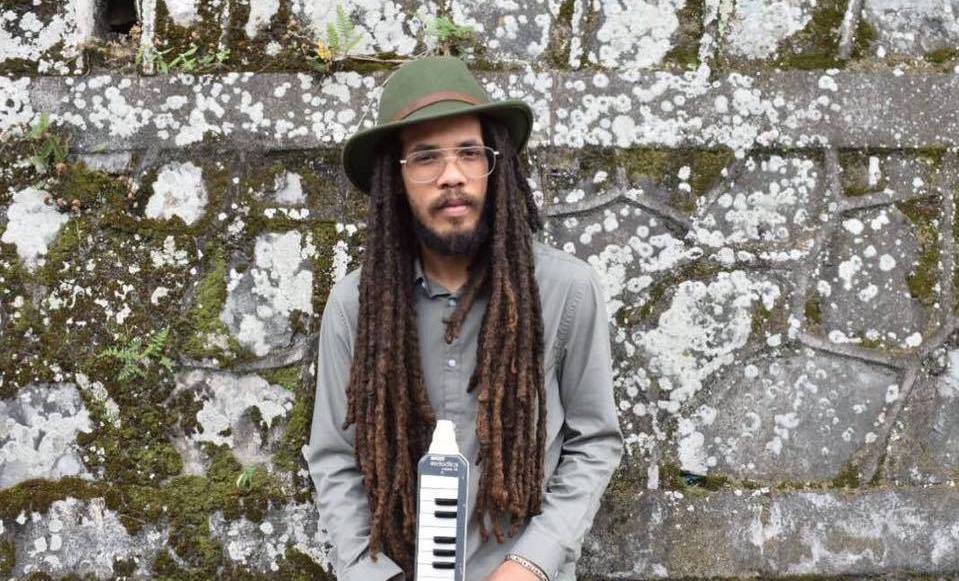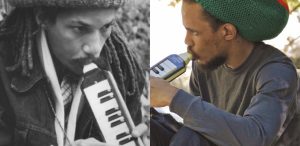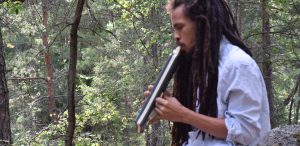
Addis Pablo discusses Majestic Melodies, his father’s “livity” and forthcoming tour
In our recent introduction to the music of Addis and Augustus Pablo, we explored how Addis had followed in his father’s footsteps, helping to honour and maintain his musical legacy. From mastering the melodica to initiating the Rockers clothing line – Addis, alongside sister Isis and the Rockers International foundation, ensured the sound and aesthetic of Rockers lived on after their father’s passing. It was our great pleasure to catch up with Addis, spending time in the U.S., ahead of his April U.K. tour. The warm, open and intelligent artist told us more about his latest projects, his father’s “livity” and his feelings about Jamaica. Catch Addis Pablo live with The Uppercut Band at Band on the Wall on 19th April.
Yourself and Equiknoxx have just released the incredible Majestic Melodies mixtape, bringing your melodica to the forefront. Was it a fun experience to put together and what else can we expect to see and hear from the project, prior to your next LP?
‘True true! The mixtape was something we’d wanted to do for a while. We [the Equiknoxx crew and I] have worked with Masicka and Shanique Marie previously on a track called ‘Lighters’ – so we’ve always had a connection, and felt it was the right time. We wanted to showcase the melodica upfront, call it “Majestic Melodies” and pay attention to the sound or foundation that I’m from – my Dad, Augustus Pablo, his time and era – but also take tracks like Earl Zero’s ‘Home’ and highlight those within the mix. It was definitely something joyful, the whole process! We spent almost a year working on it prior to releasing it. Over that year we compiled everything, spent time in the studio recording, as well as having our life experiences and all of that. A lot of the production was done by myself and by Gavin [Blair aka. Gavsborg], there’s some original Rockers stuff like ‘Home’ by Earl Zero and there are even some hip-hop vibes thanks to Mr Williams’ ‘Can’t Forget (About Pablo)’ – so, you’re getting a variation of vibes throughout the tape. For me, it’s like these majestic melodies can be found throughout music – in many forms y’know! As far as the next release, we’re working on the Majestic Melodies EP now, which will include most of the original works from the mixtape. It should be available in the next month or two at the latest, we’re just mixing down and getting everything finalised.’
Augustus Pablo was a tremendously influential figure in reggae music, but to yourself and your sister Isis, he was first and foremost, a father. What was life like growing up with your mother and father and what were the most important lessons they taught you?
‘I would say…not so much the things they said as the things that they did. As we say sometimes: actions speak louder than words. The way in which we both were raised and the way we saw our Dad live with people – creating his music and being a very influential person, not just musically speaking: treating people well, being a father-figure to many, supporting a business…doing so many things. We say being a Rasta Man in Jamaica, he was the true definition of one – a very spiritual person who lives that way and deals with people in that way, so that level of “livity”, to experience that as a youth as part of your upbringing shows you different things. Everybody’s going to have a different experience growing up, so for us that experience opened our eyes in a way and also…made us who we are, consciously or unconsciously. My sister, she’s doing her thing creatively, art and DJ’ing, all types of things, our parents always facilitated that – both directly and indirectly – by being creative. My dad [being a musician] and her mum being a teacher, we were able to express ourselves and grow in a way which put us on that right path.’
As your biography states, you carry on your father’s musical legacy in the name of Haile Selassie I. Having passed at a young age, do you feel your father had more that he wanted to achieve than he was able, and did the circumstances of his passing inform your decision to follow his path, rather than move into other areas of music or work?
‘Definitely. Due to the unfortunate timing and circumstances surrounding his passing, especially at his early age, it was important his work continue. Since that time, it has spread so much further, with the internet and so forth – many more people are aware of his music than before [his passing] and have developed a closeness with it. I think the works naturally have grown and for me – as a youth, to grow up being his son and listening to the music – I always had a feeling towards it. I didn’t necessarily take the melodica up immediately after saying I wanted to do music, but over time, I gradually started to practise it and it grew on me, of course. It’s something that was naturally a part of my life, so it’s very heartfelt to present his works and definitely, in some ways, a continuation of the work that he might not have got to do. Going to certain countries, playing in certain places, things like that. I’m definitely here to carry that on, with my own works and as always, highlighting his works – just like we’ll be doing in April in the UK. It’s something that has been a part of my performance or repertoire since day one, ‘cause that’s initially how I started to play music – playing my dad’s music, to learn it and figure out everything – even though I was already creating my own stuff. That’s when I really started performing on stage.’
You launched the Rockers clothing line last year, maintaining the vintage aesthetic of the old record labels, the original sound system and Orange Street record shop. What is yours and the foundations’ vision for Rockers going forward?
‘For me, as I said earlier, a continuation of the [Augustus Pablo] legacy and preserving the immense body of the work that my Dad created. But also, allowing it to be tangible in a sense. Having things like t-shirts, special pictures or things that maybe weren’t available before [the line] or were only in a limited quantity – making them more widely available to supporters young, old and in-between. People always want to make a connection with him [Augustus] given the way his music influences them…you want something to see, you want to hear the music but also want the record or poster, t-shirt, even a postcard or sticker – just to continue the effect of this music and carry it in different forms. Sometimes you might not be able to come to Jamaica, so we give you something that gives you a piece of that vibe…or a taste of that energy, whether it be a song, music video or just something tangible like a record, y’know.’
Production equipment is of great significant in reggae music, especially in dub. Do you like getting hands-on with the equipment and tailoring the home studio setup and if so, what are your favourite pieces of equipment to use at present?
‘I work in a lot of different studios…of course you have the laptop [wherever you work], but as far as my home studio is concerned – I don’t necessarily have any outboard gear at the moment – but I’m definitely looking into getting some space echo units, a proper analog board and things. As of this moment, I usually work from my laptop and go into a studio to then use these type of things. But I’m a fan of any [gear] – from the simplest to the most complicated – I just love the whole world of engineering. That’s one of the first things that I gravitated towards in music: that aspect of equipment, the sounds and these type a things. It’s something I’ll be gradually building up as we progress with the record shop, introducing Rockers International Soundsystem, having a studio in Jamaica – things like this. All in due time! So yeh, using that new technology but of course incorporating it with that analog setup, that real sound!’
There are many reggae fans in Britain who’ve never travelled to Jamaica, nor the Caribbean for that matter. Could you tell us your thoughts about your homeland, its most beautiful aspects and perhaps areas you might like to witness change in the country too?
‘In Jamaica…I would say the most valuable asset – outside of the natural beauty and the natural mystic – is the people. The people of Jamaica are some of the most enduring people and resourceful too, due to the circumstances of life for the majority of them. Considering the amount of great works that have come [from Jamaica and its people]…meaning music, sports, politics, history writers, poets, freedom fighters – all these types of people – too many to name – I would say that’s the most valuable asset in terms of Jamaica and that’s what gives me the greatest joy in Jamaica, outside of the natural aesthetic and being there.The feeling you get interacting with people.
For the most part it’s good [the situation], even if sometimes bad things do happen – there’s a lesson to be learned and it happens in a way in which [ultimately] could be worse. My dad would say “it’s like a training ground” y’know, you learn about life and yourself and a lot of things in a small space. As far as the negatives go, not so much a negative but something to improve, I’d say…support the teachers on strike in Jamaica, things like that. But otherwise, it’s a natural mystic that’s for everybody to see and if you don’t get a chance to see it you can maybe listen to our music, see the movies, documentaries, read up whatever the case is! But it’s one of the best places to be – it’s a very blessed place.’
We’re excited for your show in Manchester with The Uppercut Band. When you play live, what is the most important thing you want the audience to take away from the show?
‘[Considering] the journey…say when I come to London via the States, from Jamaica…everything that it takes for the music to come together and for us to share that moment – I just want people to know that it’s very true to me and it’s something that is close to my heart! That’s pretty much why I do it. For me, to be able to play my Dad’s music and represent him on a stage, somewhere like London – where’s been a lot of support for his music since the seventies – words can’t express the feeling but all I’ll say is I express it through the music and that’s how I say, thank you!’








